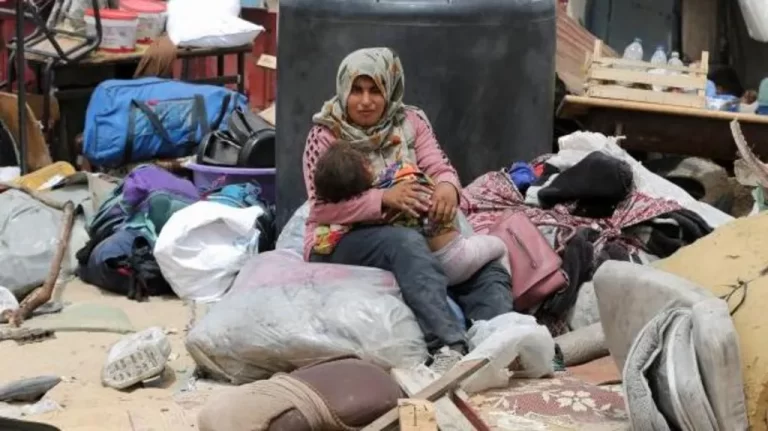The US does not believe Israel has launched a full-scale invasion of Rafah in southern Gaza, White House spokesman John Kirby has said. He spoke hours after Israeli forces reached the centre of the city and reportedly seized a strategically important hill overlooking the nearby border with Egypt.
US President Joe Biden said this month he would limit weapons supplies to Israel if it entered the “population centres” of Rafah, where hundreds of thousands of civilians are still believed to be sheltering.
Mr Kirby was also questioned about an Israeli strike and a resulting fire that killed at least 45 Palestinians – many of them women, children, or elderly – at a camp for displaced people on Sunday. Israel has said the strike targeted and killed two senior Hamas officials, and that it believes the fire could have been caused by an explosion at a Hamas weapons store nearby.
Speaking to reporters, Mr Kirby described images from the aftermath of the strike as “heartbreaking” and “horrific”.
“There should be no innocent life lost here as a result of this conflict,” he added. The US state department said it was watching closely for the Israeli military to conduct a quick and thorough investigation into the strike.
Pressed by BBC correspondent Tom Bateman on whether previous such investigations had led to accountability, state department spokesman Matthew Miller declined to name specific cases.
“You cannot reach a conclusion about the results of these investigations in the middle of a conflict,” he said. When the White House spokesman was asked whether the strike had violated the limits previously set by President Biden, he said he had “no policy changes to speak to”.
“We don't support, we won't support a major ground operation in Rafah,” Mr Kirby said.
“The president said that, should that occur, then it might make him have to make different decisions in terms of support.
“We haven't seen that happen at this point. We have not seen them smash into Rafah.
“We have not seen them go in with large units, large numbers of troops, in columns and formations in some sort of co-ordinated manoeuvre against multiple targets on the ground.” Israel has insisted it will not be able to achieve victory in its seven-month war against Hamas in Gaza without taking Rafah and rejected warnings of catastrophic humanitarian consequences.
The Israel Defense Forces (IDF) first began what it called “targeted” ground operations against Hamas fighters and infrastructure in the east of Rafah on 6 May. Since then, tanks and troops have gradually pushed into built-up eastern and central areas while also moving northwards along the 13km (8-mile) border with Egypt.
Speaking to CNN on 8 May, President Biden said he had made it clear to Israeli Prime Minister Benjamin Netanyahu that “if they go into Rafah, I’m not supplying the weapons that have been used historically to deal with Rafah, to deal with the cities, to deal with that problem”.
He said he had not suspended the supply of weapons at that point because Israel had not yet “gone into the population centres” in Rafah and that its operations had been “right on the border”. The president is facing growing calls at home to put greater pressure on the Israeli government to ensure everything is done to minimise the humanitarian impact of the conflict.
Democratic Senator Chris Van Hollen, who visited Gaza in January, told the Washington Post: “The escalating civilian death toll and deepening humanitarian catastrophe make clear that the Biden administration should pause additional offensive military assistance to the Netanyahu government until we know that all the president’s requests, including with respect to Rafah and the urgent delivery of humanitarian assistance, will be respected.”


